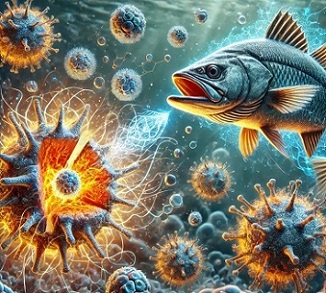Nikhil Prasad Fact checked by:Thailand Medical News Team Jul 01, 2024 9 months, 3 weeks, 4 days, 20 hours, 23 minutes ago
COVID-19 News: In the ongoing battle against viral diseases like COVID-19, scientists are constantly searching for new ways to combat these invisible enemies. In a new research by scientists from New York Structural Biology Center-USA, George Mason University-USA, Hofstra University-USA, National High Magnetic Field Laboratory-USA, Institute for Bioscience and Biotechnology Research-USA and Oregon State University-USA that is covered in this
COVID-19 News report, Piscidin 1 (P1), a peptide originally found in fish, was found to possess the potential to disrupt the membranes of enveloped viruses, including SARS-CoV-2, the virus responsible for COVID-19. This breakthrough offers hope for developing new antiviral therapies that could complement existing vaccines and treatments.
 A Fish-Derived Peptide Could Fight COVID-19
Image - AI Generated
What is Piscidin 1?
A Fish-Derived Peptide Could Fight COVID-19
Image - AI Generated
What is Piscidin 1?
Piscidin 1 is a type of host defense peptide (HDP) that helps fish fight off infections. HDPs are part of the immune system and work by attacking the membranes of pathogens, including bacteria and viruses. P1 is particularly interesting because it is amphipathic, meaning it has both water-loving and water-repelling properties. This allows it to interact with the lipid membranes that surround viruses.
How Does Piscidin 1 Work?
Viruses like SARS-CoV-2 are surrounded by a lipid envelope, which they acquire from their host cells. This envelope is crucial for the virus's ability to infect cells. Researchers have found that P1 can disrupt this envelope, thereby inactivating the virus. This disruption occurs because P1 interacts with the lipids in the viral envelope, causing the membrane to become permeable and leading to the virus's destruction.
Testing Piscidin 1 Against SARS-CoV-2
To test the effectiveness of P1 against SARS-CoV-2, scientists conducted several experiments using Vero E6 cells, a type of cell commonly used in virology studies. They exposed the virus to different concentrations of P1 and observed its impact on viral replication.
The results were promising. P1 significantly reduced the ability of SARS-CoV-2 to infect cells. Even at low concentrations, P1 inhibited viral replication by over 50%. This suggests that P1 is highly effective at disrupting the viral envelope and preventing the virus from establishing an infection.
The Versatility of Piscidin 1
One of the remarkable features of P1 is its versatility. It is effective against a wide range of viruses with different lipid compositions in their envelopes. For example, HIV-1, another enveloped virus, has an envelope rich in cholesterol, making it more stable and harder to disrupt. Yet, P1 has been shown to be effective against HIV-1 as well. This broad-spectrum activity makes P1 a valuable tool in the fight against various viral infections.
Understanding the Mechanism
/>
To better understand how P1 disrupts viral envelopes, researchers conducted biophysical experiments using viral envelope mimics. These experiments revealed that P1 can insert itself into the lipid bilayer of the viral envelope, causing the membrane to become less stable and more permeable. This destabilization leads to the virus's inactivation.
Additionally, P1's interaction with cholesterol-containing membranes was studied. Cholesterol is known to make membranes more ordered and stable, which helps protect viruses. However, P1 was found to be particularly effective at disrupting membranes with high cholesterol content, further highlighting its potential as a broad-spectrum antiviral agent.
Potential for Therapeutic Development
The discovery of P1's antiviral activity opens up new avenues for therapeutic development. Researchers are exploring ways to enhance the peptide's effectiveness and stability, making it suitable for use in humans. One approach is to modify the peptide to improve its pharmacokinetic properties, such as its stability in the bloodstream and its ability to reach target tissues.
Furthermore, combining P1 with other antiviral agents could enhance its effectiveness. By targeting different stages of the viral lifecycle, such combination therapies could provide a more comprehensive approach to treating viral infections.
Conclusion
The fight against viral diseases requires innovative solutions, and Piscidin 1 offers a promising new weapon. Its ability to disrupt the membranes of a wide range of enveloped viruses, including SARS-CoV-2 and HIV-1, makes it a valuable candidate for developing new antiviral therapies. While further research is needed to fully understand its mechanism and optimize its use in humans, the potential of P1 to complement existing treatments and enhance our ability to combat viral infections is significant.
As scientists continue to explore the capabilities of Piscidin 1, we move one step closer to a future where we can more effectively fight off viral threats and protect global health.
The study findings were published in the peer reviewed journal: Frontiers in Chemistry.
https://www.frontiersin.org/journals/chemistry/articles/10.3389/fchem.2024.1379192/full
For the latest
COVID-19 News, keep on logging to Thailand Medical News.
Read Also:
https://www.thailandmedical.news/news/norwegian-study-finds-that-salmon-oil-shows-promise-in-boosting-immune-health-after-covid-19
https://www.thailandmedical.news/news/growth-hormone-treatment-offers-hope-for-long-covid-neurological-symptoms
https://www.thailandmedical.news/news/hesperidin-s-role-in-combating-covid-19
